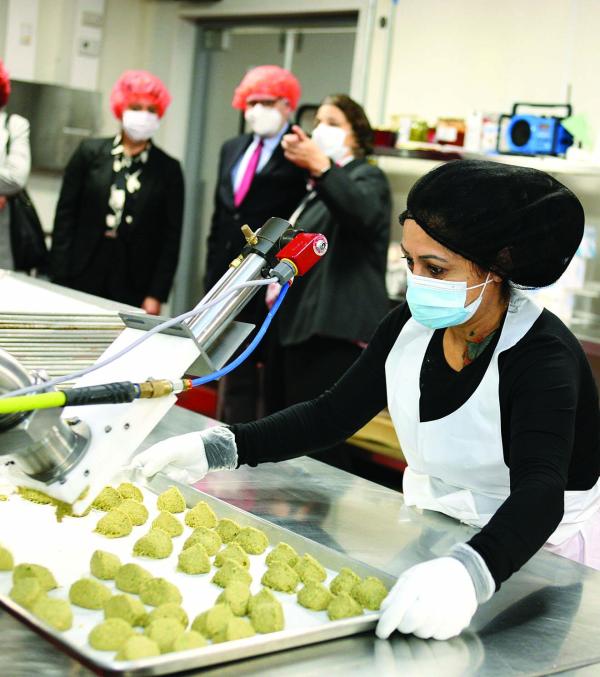October 19, 2022

Commonwealth Kitchen employee Johana Aponte makes the facility’s unique pea-based falafel product as USDA Deputy Secretary Jewel Bronaugh and State Agricultural Commissioner John Lebeaux look on Monday morning. Seth Daniel photo

The typical site visit for higher-ups at the US Department of Agriculture (USDA) include muddy boots, rolling fields of wheat in the Midwest, or fruit-filled orchards in California, but this week the USDA came to Dorchester to promote the agency’s interest in an urban agriculture model underway at two sites in our neighborhood.
USDA Deputy Secretary Jewel Bronaugh dropped by the Commonwealth Kitchen facility on Quincy Street and Oasis on Ballou near Codman Square on Monday, a visit, the USDA said, that “follows recent efforts to support and expand urban agriculture, which plays an important role in growing healthy food, providing jobs, and beautifying neighborhoods in urban and suburban areas.”
At Commonwealth Kitchen, executive director Jen Faigel highlighted the history of the commercial facility, noting that it started as a way for food trucks and home kitchens to expand their businesses while adhering to food safety guidelines. Now, it’s the Kitchen’s manufacturing program that is of great interest to the USDA, because it helps farmers by using fresh produce for things like marinara sauces, and then uses in-house labor to make mid-level quantities of the product — up to 200 gallons a day for sauces.
USDA Deputy Secretary Jewel Bronaugh and State Agriculture Commissioner John Lebeaux are welcomed to Commonwealth Kitchen by Executive Director Jen Faigel on Monday morning as part of a state agricultural tour. Seth Daniel photos
Bronaugh called the facility’s operators “masterminds” for being so nimble and innovative. “I am so interested in what you’re doing here,” she said. “The hard stuff is done here. You increase capacity for these businesses and that’s hard, and you seem to have mastered it.”
John Lebeaux, Massachusetts Commissioner of Agriculture, said the Kitchen has become a key investment for the state over the years. “This place is a game-changer,” he said. “Besides supporting farms, it’s also creating jobs and economic development. It’s become sort of a sweet spot for Massachusetts.”
Said Faigel: “We had a business that was in 150 stores and couldn’t work with a co-packer and she just got stuck,” said Faigel, noting that co-packing facilities will only work with frozen ingredients. “So, we came up with a crazy idea to aggregate the labor here…That actually made partners like Whole Foods more comfortable because they could look to us for food safety assurances.”
State Agricultural Commissioner John Lebeaux (left) and USDA Deputy Secretary Jewel Bronaugh at Commonwealth Kitchen on Monday.
Tyler Seever, the Kitchen’s COO, said they are about halfway to a co-packer capacity, which is the difference between success and failure for many of the urban agriculture and food-based small businesses in the city.
Having the mid-level manufacturing in-house also led them to develop the ‘Farmer Value Added’ program, which uses surplus foods headed for the compost pile or the trash to make products like sauces or Kale pesto. The farms bring the surplus produce to the Kitchen, and they cook, can, and label the products for the farms. Then they can be sold in the off-season.
“The result is these urban farms can make money on something that was bound for the compost pile or the trash,” said Faigel.
On the commercial kitchen side, Nathalie Lecorps of Gourmet Kreyol Food Truck, Boston’s first Haitian food truck, said she learned quite a lot about the food business by being in the Kitchen. She started the truck from her experience in Miami where her parents operate a Haitian restaurant. However, she said, a program where new operators can shadow experienced operators at the Kitchen helped her reduce costs by half.
Gourmet Kreyol Food Truck owner Nathalie Lecorps said shadowing other successful food truck operators at Commonwealth Kitchen helped her to cut her operating costs in half.
“I was able to shadow another successful food truck running out of Commonwealth Kitchen, called Jamaican Me Hungry, and what I learned allowed me to cut costs down by half,” she said. Added Faigel, “A lot of this is conversations and learning from each other. It’s a surprise for a lot of people that food trucks help each other be successful.”
The USDA troupe’s visit included a stop at the urban farm Oasis on Ballou, where they observed the roots of urban agriculture. Other stops included a cranberry bog in Middleborough and a tour of UMass-Lowell.


